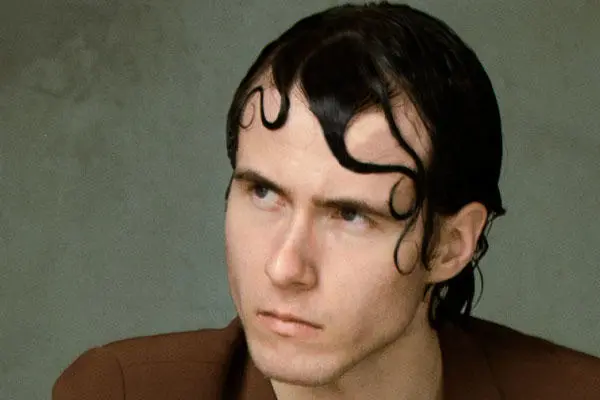
MA Make-up and Hair Design Futures
Explore the rapidly evolving field of designing for future bodies, beauty cultures and creature design using speculative design strategies and augmented realities

Unleash your imagination to create characters for stage and screen - develop your portfolio of work using the latest design techniques and learn from experienced industry experts.
Push the limits of your creative boundaries on this dynamic prosthetics and special effects degree. With a hands-on approach to design for a range of contexts, you’ll be supported to develop the skills and experience to enter a range of careers in film, TV and theatre after graduation. From character creation to specialist technical skills, this course aims to develop your understanding alongside your technical abilities.
You will be encouraged to take an explorative and technical approach to prosthetics application, using materials and creative development processes to produce innovative and contemporary special effects design work. This will include sculpting, moulding and casting for character and creature effects, refined application of make-up and hair effects and designing with 2D and 3D modelling.
While the emphasis is on the development of your technical abilities within the creative industries, you'll be encouraged to a adopt a professional and experimental approach to prosthetics and special effects.
Our students are equipped with design knowledge, research skills and practical techniques necessary to gain an understanding of their studies within a social and cultural context.
Using advanced academic research methodologies, developed through critical and interdisciplinary approaches to design, we encourage you to devise intellectual, creative and innovative responses to challenging concepts, relevant to contemporary design and speculative futures.
You will be taught by an academic team with excellent reputations as practicing professional designers and researchers, as well as an extensive range of visiting lecturers and international visits to gain vital industry insight.
Practical experience is at the core of our real-world learning, and you can develop your techniques by studying in our well-equipped studios and workshops, ranging from make-up, hair and special effects studios to photography studios, IT suites and a comprehensive Virtual Learning Environment (VLE) to support your learning.
We also provide in-house competitions, with prizes from our kit suppliers, Neil’s materials and Pigs Might Fly. And we encourage our students get regular experience through Halloween events such Terror Island and the Horror Maze, regular WBL experience with MAST, Mayflower theatre and The Grange festivals.
Situated alongside the other creative courses in Television, Film and Theatre production, the course also provides you with opportunities for collaborations, to help you contextualise your place within the prosthetics and special effects industry, offering you a rich and stimulating education and preparing you for future employment.
In your final year there is the opportunity to work with our professional SFX team at the Prosthetics Event, across a range of national theatre productions or at IMATS in London.
Contact international admissions
Email: Call:Our creative degrees allow our students to develop a critical eye for design with a knowledge of different design approaches and problem solving techniques. Take a look at some of the great work they produce.

If you're not quite ready for a full undergraduate degree, there's alternative entry through one of our foundation years
This course has access to specialist facilities
After successfully completing your studies, there's an opportunity to continue your studies at Solent
If you have an appropriate Level 5 qualification, you can top it up to a degree in just a year
You have the opportunity to study abroad in one of our partner universities for a semester on this course
Solent’s prosthetics and special effects design course is ideally suited to students who wish to expand their knowledge and develop their creative design skills in design, production and application - across theatre, film and TV. Applicants should have usually studied a creative subject and have a portfolio of related art and design work to show as part of their application to the course.
On leaving the course you will have a core skill set needed to work in industry, as well as the ability to design and develop new characters. You could gain entry level to work as a studio artist, sculptor or prosthetics designer. Your skills could also be well-placed in medical prosthetics for trauma injury, for the film and TV industry or for trauma response training. The course could also lead to further study at MA level for more developed and focused skills.
Students learn from a team with a broad range of academic and industry experience, who are have a desire to advance the industry and academic expectations of what prosthetics and special effects design can be.
The University cannot guarantee any particular members of staff will teach specific aspects of the course in the future, but will endeavour to ensure the teaching team maintains their balance of experience and qualifications.
Our specialist studios and workshops include industry-focused special effects studios, fibre glass lab, plaster room, 3D printing labs, make-up and hair design studios, photography studios including an infinity cove and a range of well-equipped IT suites.
Our vibrant campus brings state-of-the-art facilities to enhance your learning and elevate your student experience. Our award-winning teaching building, The Spark is centred around students and offers a stimulating study environment with flexible learning spaces. Away from studying, why not try out the gyms, fitness studios and sports halls in our £28 million Sports Complex, or watch a blockbuster film at our student-run cinema with Dolby Atmos audio.
Broaden your horizons by adding an international dimension to your CV – essential to achieving success in today’s fast-changing, global environment.
Studying, working or volunteering in another country could be the experience of a lifetime. Enhance your degree by developing important global skills such as knowledge of other countries, language skills, intercultural awareness, adaptability and confidence.
For more information, please email international.mobility@solent.ac.uk.

In this module, you will be introduced to creating characters and conceptualising your ideas for a specific cinematic genre and will learn the most appropriate characterisation techniques to develop your interpretation of a character based on a literary classic book.
On this module you'll be introduced to photographic language from both a practice and conceptual perspective. You will look at the mechanics of image making and become familiar with the function of cameras, lenses and lighting, as well as ideas around image making, the history of the medium and its place within contemporary culture.
This module will enhance ways of seeing, thinking and writing about visual culture. You will learn about key cultural developments, practices and movements related to the history of design, visual and popular culture and the styled body since 1900 to the present day.
This module explores design as a visual strategy for not only resolving problems but also posing questions. Enabling you to place your practice in a broader social and cultural context, and help you recognise yourself as an independent, creative designer.
In this module you will work closely with your Technical Instructors who will provide you with the discipline and rigour needed to engage in practical tasks. You'll have an introduction to make-up and hair application and theory, including skincare, creating a polished professional base and colour theory as well as the basics of working with hair correctly – from washing and blow drying, to using suitable products with electrical tools for a variation of styles and a basic knowledge of hair practice.
During this module you will be introduced to the visual and cultural history of style, how this has influenced a range of subcultures, and also how these varied identities continue to influence contemporary design and media. You will learn to place your practical work in a creative context, by critically exploring a range of historical, socio political and ethical issues.
Solent’s curriculum framework builds on our unique, creative and applied approach to teaching. The transformation of students’ lives is at the heart of our mission as a university, and our curriculum – informed by the latest theory – reflects this shared educational vision.
Find out more
The student achievement team are on hand to help you succeed during your studies at Solent. They aim to contact you at key times during your time here with personalised information, advice and guidance, by email or phone.
The disability advice team provides information, advice and guidance for disabled students.
All students can access Succeed@Solent, Solent's online guide to getting better grades. It offers extensive, practical information and advice on topics such as academic writing, research and presentations.
Special effects make-up artists focus on working on actors appearances for their role on screen in everything from ageing, to injury simulation, or even monster make-up, anything from what a regular make-up artist may be responsible for. This specialist role is key for many film and television productions, but can also extend to theatre, events and live entertainment.

Typical day rate: £400
Trainee special technicians earn a minimum of £13.25 an hour, or a day rate of £145.75. Technicians (with five years' experience in the industry) earn a minimum of £37.10 an hour, or a day rate of £408.10. Senior technicians (with 10 years' experience) earn a minimum of £43.46 an hour, or a day rate of £478.06. Supervisors (with 15 years' experience) earn a minimum of £79.81 an hour, or a day rate of £877.91.
Typical day rate: £400
Trainees should receive no less than the national minimum wage or the London living wage. For a feature film, trainee make-up artists currently earn between £11 and £14 per hour. On major feature films, with budgets over £30million, a trainee make-up artist can earn £140 for a ten-hour day, while a key hair and make-up artist with several years' experience, will earn £410.
The stated salaries are published on prospects.ac.uk.
The Solent Careers team is committed to getting students into great careers.
While you are studying, the team can help you with finding work experience or placements, link you with a mentor, check your CV, or offer one-to-one guidance.
If you're in your final year, we also have graduate job opportunities just for Solent graduates.

6th
UK uni for sustained employment
Longitudinal Educational Outcomes, 2022
Every student at Solent University will also have the option to study an additional Certificate in Practical Artificial Intelligence qualification alongside their course. Free of charge, the course ensures you'll be prepared for a fantastic and varied career after graduation.


Thinking about studying further than an undergraduate degree? Alumni can get 20% off their postgraduate study.

Explore the rapidly evolving field of designing for future bodies, beauty cultures and creature design using speculative design strategies and augmented realities

Take charge and lead a wealth of fashion and beauty brands to success with your innovative and creative vision on this practice-based master's degree.

Do you have an eye for design? Would you like to help influence the future of visual communications? Our MA Visual Communication degree is ideal for creatives keen to refine their practice, working as part of an interdisciplinary group of students.
The tuition fees for the 2025/26 academic year are:
For further information, please visit our tuition fees page.
While most course costs are covered by your tuition fees, some essential resources and optional extras may need to be paid for separately. These additional costs are listed below. For advice on budgeting and managing your money, please contact student.funding@solent.ac.uk.
The 2025/26 other costs are not yet available. For guidance, the 2024/25 other costs were:
Compulsory costs
Optional costs
Solent University offers a range of bursaries and scholarships that provide financial assistance or waive fees for tuition or accommodation. Each bursary or scholarship has specific eligibility criteria. Check out our bursaries and scholarships pages to find out more.
Solent EU Welcome Scholarship (Fee Discount)
This scholarship is available to students from an EU country, with EU nationality, who are applying for an undergraduate course starting in September 2025. The scholarship will reduce your tuition fees to £10,500 per year - this includes foundation years.
Find out more about the scholarship
Cost of living support
At Solent, we understand that the cost of living crisis may be of some concern. To help, we've put together some detailed information to show what support is available and how to make your money go further.
There is no charge to attend graduation, but you will be required to pay for the rental of your academic gown (approximately £45 per graduate, depending on your award). You may also wish to purchase official photography packages, which range in price from £15 to £200+. Graduation is not compulsory, so if you prefer to have your award sent to you, there is no cost. Extra guest tickets will go on sale after results publication and will be sold on a first-come-first-served basis. The cost per ticket is currently £15. Please note, we do not guarantee there will be any extra tickets available to purchase.
Please select an option below:
As a general guide, we look for qualifications that are equivalent to the British high school A-levels.
Applicants from outside the UK will be required to send an electronic portfolio and may be interviewed by video call.
If you are applying from outside the UK, find information about entry requirements, visas and agents for your country here.
For further information about UK, EU and international qualifications, please see our course entry requirements document.
For international students who do not meet the direct entry requirements for this undergraduate degree, our trusted partner, QA Higher Education offers the following pathway programme designed to develop your academic and English language skills:
As a general guide, we look for qualifications that are equivalent to the British high school A-levels.
Applicants from outside the UK will be required to send an electronic portfolio and may be interviewed by video call.
If you are applying from outside the UK, find information about entry requirements, visas and agents for your country here.
For more information about qualifications, please see our course entry requirements document.
For international students who do not meet the direct entry requirements for this undergraduate degree, our trusted partner, QA Higher Education offers the following pathway programme designed to develop your academic and English language skills:
All international applicants need to be aware that the English language requirements to attend Solent University, and the English language requirements to obtain a visa from the Home Office, may be different. This means that if you meet the Solent University language requirement to gain a place on the course, you may still have to meet additional requirements to be granted with a visa by the Home Office.
We strongly advise all applicants to visit the Home Office website which outlines all the requirements for a successful visa application.
Contact international admissions
Email: Call:Full-time
Any student applying for the first year of a full-time/sandwich undergraduate course must apply through UCAS (University and Colleges Admissions Service). This includes mature, overseas and EU students.
Nearly all schools and colleges offer their students the facility of applying electronically through the UCAS website using 'Apply'; it may also be used by those applying independently in the UK and overseas. This facility and all course information can be found on the UCAS website: www.ucas.com.
Your application should reach UCAS by 31 January if you hope to enter a course the following autumn. Early application is advised for the most popular subject areas. Late applications may be made until the end of June. The UCAS Code for the University is S30, code name SOLNT.
Find out what happens after you apply
Contextual offers
Solent endeavours to offer learning opportunities to students from all backgrounds. When we receive and review an application, we take into consideration the context and personal circumstances of applicants when making a decision, which means our advertised entry tariff could be reduced.
Top-up route:
We welcome applications from students currently studying a Foundation Degree, DipHE, HNC, HND or modules of an undergraduate degree course at another university, who wish to enter directly into Years 2 or 3 of one of our undergraduate degree courses. Please contact our admissions team for more information: contact us
Applicants who do not have English as their first language will be required to demonstrate an approved level of proficiency in the use of the English language. The agreed minimum requirements for this course are:
Qualifications are checked before enrolment, and international students must bring their original certificates or certified copies when coming to study at the University.
Pre-Sessional English programme
The University also offers a pre-sessional English programme for international students who wish to improve their level of English before starting a degree course.


